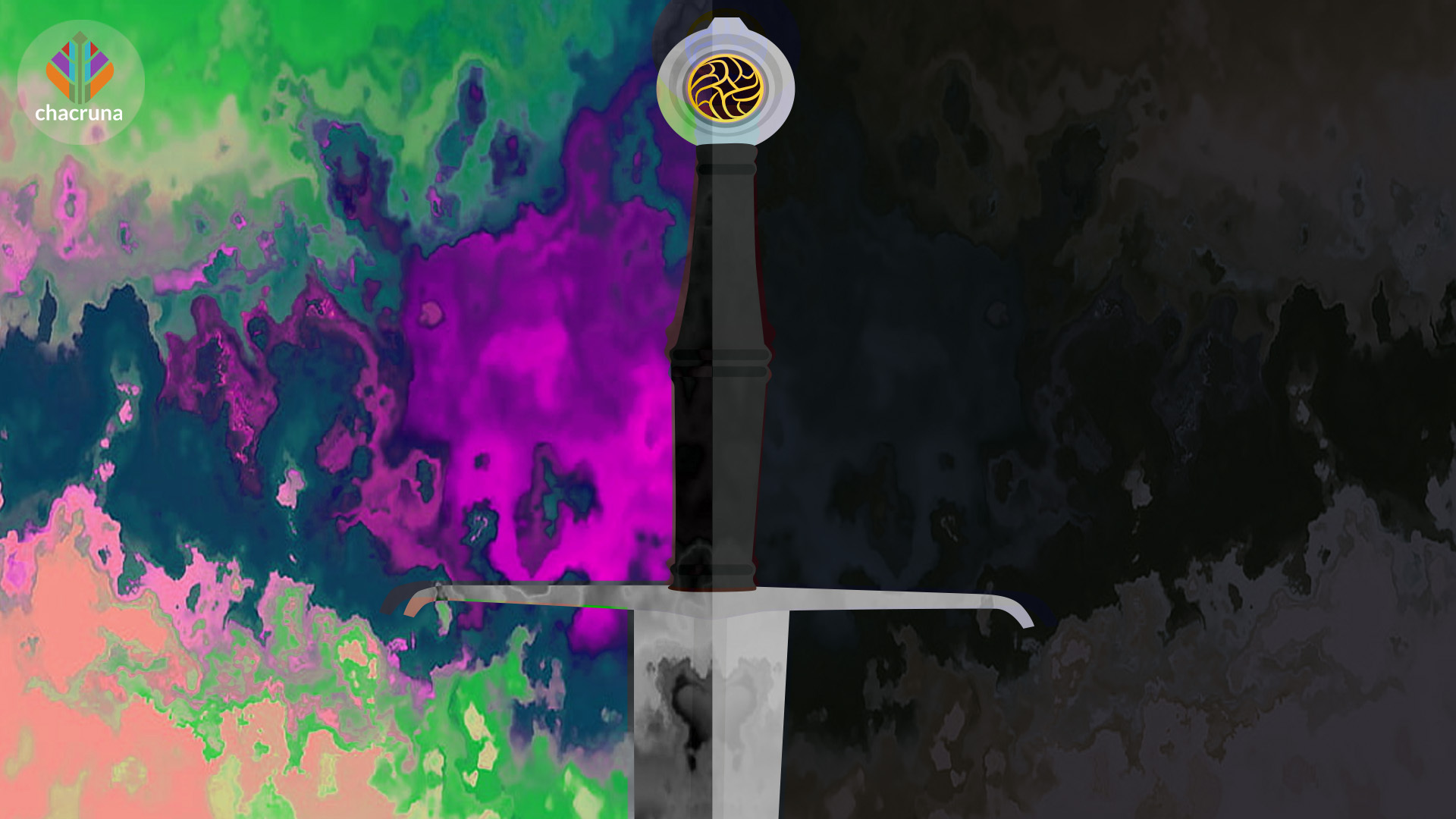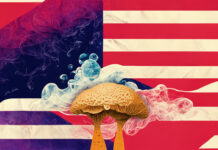- Navigating a Double-Edged Sword: Toward Psychedelic Apprenticeship - October 13, 2021
- The DMT Experience, The Human Brain & The Science of Consciousness - May 2, 2017
- Navigating a Double-Edged Sword: Toward Psychedelic Apprenticeship - October 13, 2021
Psychedelics are rapidly achieving the status of breakthrough therapies based on their potential for human development (Nutt, Erritzoe, & Carhart-Harris, 2020; Schenberg, 2018). At the same time, psychedelics may facilitate experiences of distressing or troubling revelations with unexpected or negative consequences to mental health.
It appears that it is the same psychedelic phenomena that drives both desirable therapeutic outcomes and negative consequences in mental health: the ability of these substances to induce experiences of insights and revelations.
It seems increasingly apparent that spiritual experiences and transformational insights are contrasted by forms of spiritual escapism, the evocation of false memories, the endorsement of conspiracy theories, and even instances in which these experiences form the basis for social manipulation. The ambivalent nature of the psychedelic experience has led us, in a recently published article (also involving the psychotherapist Rosalind Watts) to label psychedelic experiences as a double-edged sword (Timmermann et al., 2020). It appears that it is the same psychedelic phenomena that drives both desirable therapeutic outcomes and negative consequences in mental health: the ability of these substances to induce experiences of insights and revelations.
These problems resonate with issues which other forms of psychotherapy have encountered in the past. Since the times of Freud, the uncovering of repressed traumatic episodes during therapy brought into questions of whether or not these were factual events or so-called “false memories”. These issues have been noted as typical cases of potentially damaging consequences psychological and legal consequences to the patient and others. More recently, issues of false memories and its personal, psychological, legal, and ethical consequences have been brought to the forefront in the United States in the 1990s (Hacking, 1995).
Join us for our next conference!
In this article, we claim that the nature of the psychedelic experience, in its unique ability to induce experiences of insights and revelations, may exacerbate these problems, and we invite the psychedelic community to face up to these issues. Drawing on our work on psychedelics involving neuroscience research, clinical practice, and ethnographic fieldwork, we will look into these issues in this article. Inspired by forms of psychedelic practice (or psychedelic know-how) embodied in some Indigenous, mestizo, and psychotherapeutic traditions, we then propose a framework to help us understand and skillfully navigate this double-edged sword, which we call psychedelic apprenticeship.
What Lies Behind “Psychedelic Revelations”?
Psychedelic-induced opportunities for personal (and possibly collective) wellbeing appear to be centrally facilitated by the psychedelic experience itself. Mystical-type and experiences of psychological insight induced by psychedelics (or “psychedelic revelations”) are indeed linked with improvements in depression, anxiety, and addiction outcomes (Yaden & Griffiths, 2021).
In the seminal text, The Varieties of Religious Experiences, William James describes crucial aspects of mystical states: 1) They provide information to the experiencer, 2) receiving this information feels direct and certain 3) this assertive quality of revelations results in personal transformation. This is also what has been labeled as the noetic quality of insights and revelations encountered during the psychedelic experience. We propose that at the core of this noetic quality lies the double-edged sword capacity of psychedelic revelations.
However, although psychedelic revelations are felt as direct or arriving from an unmediated source of spiritual or personal “Truth,” it also seems these revelations always undergo some form of mediation by ourselves and others. More so, these insights can always be validated by the social context in which they take place and this is the basis of the so-called integration process that may be seen in so many instances in which psychedelics are taken.
This does not mean that all psychedelic revelations are “false,” but that the psychedelic experience is always mediated by our biological, biographical, and sociocultural filters.
This does not mean that all psychedelic revelations are “false,” but that the psychedelic experience is always mediated by our biological, biographical, and sociocultural filters. This point is also highlighted by the tradition of anthropological studies on the use of psychotropic substances. Following this tradition and observing similarities of the features of the psychedelic experiences within the same culture, anthropologists have usually defended a culturalist approach to psychedelic experience (Levi-Strauss, 1970).
From this perspective, psychedelics are thought of as non-specific amplifiers of cultural factors and powerful tools for cultural transmission (Dupuis, 2020): The subjective feeling tone, meaning, and experiential content of psychedelic experiences are often shaped by specific cultural expectations. Among the vast family of psychotropic substances, psychedelics are indeed known to be the most highly dependent on non-pharmacological factors such as expectation, preparation, and intention (mindset), as well as physical and social environments (setting) (Hartogsohn, 2016).
Are Psychedelic Revelations Ethically Concerning?
The double-edged sword character of psychedelics may be facilitated by the fact that psychedelics appear to increase suggestibility. While this is probably one of the underpinnings of the therapeutic efficacy of psychedelics, it also raises serious ethical questions considering the current context of globalization of the use of these substances.
For example, problematic aspects of psychedelic revelations may occur in psychotherapeutic contexts, leading to distress and confusion. Revelations about abuse occurring during a psychedelic session can be helpful for therapy, but they may have also troubling ramifications, especially if it hard to verify if the experience of abuse actually took place. The patient may struggle with the veracity of the events: Did the instance of abuse actually happen or is it a symbolic manifestation of the psyche facilitated by the psychedelic?
The current scientific understanding of how the brain works suggests that memory is not an accurate record of past experiences, but rather a reconstructive (or creative) process, which may distort them.
The current scientific understanding of how the brain works suggests that memory is not an accurate record of past experiences, but rather a reconstructive (or creative) process, which may distort them. Our work involving the neuroscience of the DMT experience shows that psychedelics appear to enhance activity in brain functions related to memory and dreaming (Timmermann et al., 2019), implying they may enhance our innate creative processes, and therefore plausibly induce false memories or deceiving revelations. By all accounts, it appears that a lot more is going on during these revelations than simply accessing biographical or spiritual truths, and therefore a critical eye is needed when dealing with them.
Episodes of revelations can also have an earth-shattering feel to them. Our research, involving the psychology and neuroscience of DMT and other psychedelics, shows that these experiences may induce an “ontological shock” of sorts, in which users experience a dramatic change in worldviews and beliefs concerning the nature of reality. In most cases, these shifts in worldviews and beliefs are usually not a part of the informed consent provided by psychedelic facilitators and therefore raise ethical questions (Timmermann et al., 2021).
These dramatic experiences may also lead to significant transformations in values, beliefs, and behaviors that may have troubling psychological consequences. For example, our ethnographic fieldwork—within contexts that propose a cosmovision mixing Indigenous and Catholic themes—shows that the ritual use of psychedelics by Western Europeans in the Amazon increases the speed and efficiency of the transmission of specific religious beliefs and cultural propositions (Dupuis, 2021a). This belief transmission dynamic that profoundly transforms the participants’ worldview and behaviors, when not part of participants’ awareness and informed consent, also raises legitimate ethical concerns about the use of psychedelics in these contexts.
Psychedelic experiences may also lead to other troubling psychological consequences, such as forms of “spiritual bypassing”: the adoption of spiritual beliefs and practices as a form of escapism from psychological distress and relational issues (Masters, 2010). Alternatively, revelations occurring in specific contexts may lead to the endorsement of conspiracy theories, which may have detrimental consequences for health-related behaviors (for example, rejecting the usage of masks or social distancing). These issues highlight the need to find ways to address issues of validation of the revelations experienced during a psychedelic session.
Discover the Indigenous Reciprocity Initiative of the Americas
Facing up to this double-edged sword is important. Neglecting these issues opens the door for exaggerated responses, which also miss the mark. For example, in France, the government has banned ayahuasca on the basis of concerns about the possible use of ayahuasca by so-called “cult” groups for the purpose of psychological manipulation and “brainwashing” (Bourgogne 2011), which we feel neglects the potential of these practices when used in an ethical fashion.
Toward Psychedelic Apprenticeship: Navigating the Double-Edged Sword
As interest in psychedelics is in steep ascension, it seems that it is only through disciplined forms of psychedelic practice that these experiences will provide safe means for exploration, transformation, and development in Western cultures.
In our current cultural landscape, filled with fake news and misleading information, it seems necessary to navigate issues related to the validation of psychedelic knowledge. We think these challenges can be attended by fostering an awareness of the nuances of the psychedelic experiences and skillful guidance by others. As interest in psychedelics is in steep ascension, it seems that it is only through disciplined forms of psychedelic practice that these experiences will provide safe means for exploration, transformation, and development in Western cultures.
Inspired by the process of apprenticeship apparent in many Indigenous and mestizo traditions that embody skillful psychedelic practices, we have recently proposed a framework to help us understand and navigate this double-edged sword, which we have labeled psychedelic apprenticeship (Timmermann et al., 2020).
Our central proposal stresses that awareness and navigation of these complicated issues does not come about via a purely intellectual way of understanding, but it is something we grow into. It requires repeated embodied practice, and the development and honing of skills. It requires forms of apprenticeship: a process of gradual and skillful orientation by an experienced facilitator or guide. Therefore, apprenticeship is fundamentally a relational process between apprentice (or experiencer) and facilitator.
Psychedelic apprenticeship consists in the honing of practices of mediation and validation that may help one navigate these issues. A facilitator (a shaman, guide, scientist, or therapist) has experienced the opportunities and pitfalls of the psychedelic experience. This allows them to empathize and resonate with the psychedelic apprentice; it provides them with the tools to navigate the experience together. Their experience also allows them to provide the right preparation and integration, as well as the setting and therapeutic interventions during a session.
These forms of skillful know-how also provide means for facilitators and experiencers to also navigate the information gained during these revelations. It allows them to situate these within wider personal and cultural contexts, as well as provide users with tools that allow them to step back from their experience and observe it with a reflective eye.
This process of apprenticeship is already apparent in many Indigenous and mestizo traditions that embody this skillful know-how in social practices such as collective rituals and initiatory practices. The use of singing, scents, music, interventions, and support during ceremonies, as well as the ability to “read” the state of mind of users during their experience, are expressions of such know-how. These practices are themselves expressions of a process of cultural and historical processes that have refined them into their current skillful form, and thus are a crucial part of the lineages that support and provide context to these challenging issues.
The prohibition of psychedelics in Western societies since the 1960s has led to a lack of consensus on ethical guidelines for the use of psychedelics in Western societies.
The prohibition of psychedelics in Western societies since the 1960s has led to a lack of consensus on ethical guidelines for the use of psychedelics in Western societies. Despite the growing interest in these substances in these societies, there is no set of ethical criteria or standards today that are unambiguously authoritative.
Some attempts to construct and standardize psychedelic apprenticeships are, however, observed in Western forms of underground psychedelic therapy and integration circles. These expressions have developed their own in-session practices related to music, therapeutic interventions and support, and ethical guidelines, as well as procedures of preparation and integration.
These are also expressions of our own cultural and historical processes of trial and error, intellectual development, and influence from traditional processes of psychotherapy, as well as Indigenous and mestizo practices. These forms of psychedelic know-how have now been adapted to form the basis of sanctioned forms psychedelic therapy and are currently being articulated in the ethical frameworks of psychedelic therapy, and thus should be properly acknowledged. In a context of increased commercial interest in developing novel implementations and technological developments within psychedelic therapies, it is important that we ask ourselves if these innovations are coherent with current forms of psychedelic know-how, traditional lineages, and scientific findings.
What criteria will determine the ethical use of psychedelics in Western societies in the future? What ethical standards can support the double-edged sword property of psychedelics? What epistemic authority will these standards rely on to be formulated and to be imposed? What forms of psychedelic apprenticeship will emerge from these norms?
The plurality of imaginaries associated with psychedelics by social actors with divergent interests (religious groups, research laboratories, user associations, pharmaceutical companies, activist groups, Indigenous populations) among Western societies promises to make these issues the breeding ground for strong political, epistemological, and ethical tensions within these societies; dynamics that promise to profoundly transform conceptions of the mind, of the normal, of the pathological, and of the efficacy of substances within these societies.
Art by Mariom Luna.
References
Becker, H. (1953). Becoming a marihuana user. The American Journal of Sociology, 59(3), 235–242.
Bourgogne, G. (2011). One hundred days of ayahuasca in France: The story of a legal decision. In B. C. Labate & H. Jungaberle (Eds.), The internationalization of ayahuasca (pp. 353‐64). Berlin: Lit Verlag.
Dobkin de Rios, M. (1984). Hallucinogens: Cross-cultural perspectives. Albuquerque: University of New Mexico Press.
Dupuis, D. (2021a August 12). The socialization of hallucinations: Cultural priors, social interactions and contextual factors in the use of psychedelics. Transcultural Psychiatry. https://doi.org/10.1177/13634615211036388
Dupuis, D. (2021b [in press]). Psychedelics as tools for belief transmission. Set, setting, suggestibility and persuasion in the ritual use of hallucinogens. Frontiers in Psychology: Personality and Social Psychology (to be published).
Furst, P. T. (1976). Hallucinogens and culture. Novato, CA: Chandler & Sharp Pub.
Gerber, K., Flores, I. G., Ruiz, A. C., Ali, I., Ginsberg, N. L., & Schenberg, E. E. (2021). Ethical concerns about psilocybin intellectual property. ACS Pharmacology and Translational Science, 4(2), 573–577. https://doi.org/10.1021/acsptsci.0c00171.
Girn, M., Mills, C., Roseman, L., Carhart-Harris, R. L., & Christoff, K. (2020). Updating the dynamic framework of thought: Creativity and psychedelics. NeuroImage, 213, 116726. https://doi.org/10.1016/j.neuroimage.2020.116726.
Hacking, I. (1995). Rewriting the soul: Multiple personality and the sciences of memory. Princeton, NJ: Princeton University Press.
Hartogsohn, I. (2016). Set and setting, psychedelics and the placebo response: An extra-pharmacological perspective on psychopharmacology. Journal of Psychopharmacology, 30(12), 1259–1267.
Levi-Strauss, C. (1970). Les champignons dans la culture. A propos d’un livre de M. R. G. Wasson [Mushrooms in cultivation. About a book by Mr. R. G. Wasson]. Homme, 10(1), 5–16. https://doi.org/10.3406/hom.1970.367101.
Masters, R. A. (2010). Spiritual bypassing. Berkeley, CA: North Atlantic Books.
Nutt, D., Erritzoe, D., & Carhart-Harris, R. (2020). Psychedelic psychiatry’s brave new world. Cell, 181(1), 24–28. https://doi.org/10.1016/j.cell.2020.03.020.
Schenberg, E. E. (2018). Psychedelic-assisted psychotherapy: A paradigm shift in psychiatric research and development, 9, 733. https://doi.org/10.3389/fphar.2018.00733.
Timmermann, C., Kettner, H., Letheby, C., Roseman, L., Rosas, F., & Carhart-Harris, R. (2021, June 25). Psychedelics alter metaphysical beliefs. https://doi.org/10.31234/osf.io/f6sjk
Timmermann, C., Roseman, L., Schartner, M., Milliere, R., Williams, L. T. J., Erritzoe, D., Muthukumaraswamy, S., Ashton, M., Bendrioua, A., Kaur, O., Turton, S., Nour,M. M., Day, C. M., Leech, R., Nutt, D. J., & Carhart-Harris, R. L. (2019). Neural correlates of the DMT experience assessed with multivariate EEG. Scientific Reports, 9(1), 16324. https://doi.org/10.1038/s41598-019-51974-4
Timmermann, C., Watts, R., & Dupuis, D. (2020, December 30). Towards psychedelic apprenticeship: Developing a gentle touch for the mediation and validation of psychedelic-induced insights and revelations. https://doi.org/10.31234/osf.io/j5768
Yaden, D. B., & Griffiths, R. R. (2021). The subjective effects of psychedelics are necessary for their enduring therapeutic effects. ACS Pharmacology and Translational Science 4(2), 568–572. https://doi.org/10.1021/acsptsci.0c00194.
Take a minute to browse our stock:
Did you enjoy reading this article?
Please support Chacruna's work by donating to us. We are an independent organization and we offer free education and advocacy for psychedelic plant medicines. We are a team of dedicated volunteers!
Can you help Chacruna advance cultural understanding around these substances?


















